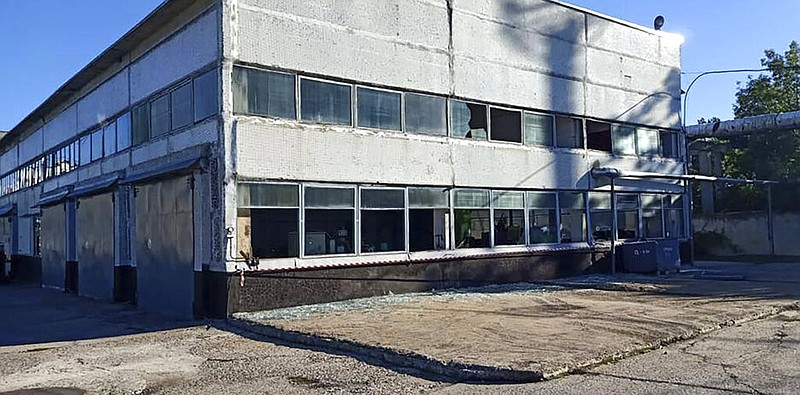KYIV, Ukraine — A Russian missile struck close to a nuclear power plant Monday in southern Ukraine without damaging the three reactors but hit other industrial equipment in what Ukrainian authorities denounced as an act of "nuclear terrorism."
The missile made impact within 328 yards of the reactors at the South Ukraine Nuclear Power Plant, blasting a crater 6 1/2 feet deep and 13 feet across, according to Ukrainian nuclear operator Energoatom.
The reactors were operating normally and no staff members were injured, the agency said. But the proximity of the strike renewed fears the nearly 7-month-long war in Ukraine might produce a radiation disaster.
The nuclear power station, which is also known as the Pivdennoukrainsk plant, is Ukraine's second-largest after the Zaporizhzhia Nuclear Power Plant, which has repeatedly come under fire. The two facilities' reactors are of the same design.
Following recent battlefield setbacks, Russian President Vladimir Putin threatened last week to step up attacks on Ukrainian infrastructure. Throughout the war, Russia has targeted Ukraine's electricity generation and transmission equipment, causing blackouts and endangering the safety systems of the country's nuclear power plants.
The industrial complex that includes the Pivdennoukrainsk nuclear plant sits along the Southern Bug River about 190 miles south of the capital, Kyiv. The attack caused the temporary shutdown of a nearby hydropower plant, shattered more than 100 windows at the complex and severed three power transmission lines, Ukrainian authorities said.
Ukraine's Defense Ministry released a black-and-white video showing two large fireballs erupting one after the other in the dark, followed by incandescent showers of sparks. A time stamp on the video read 19 minutes after midnight.
The ministry and Energoatom called the strike "nuclear terrorism." The Russian Defense Ministry made no immediate comment. The United Nations' nuclear watchdog, the International Atomic Energy Agency, did not immediately respond to a request for comment.
Russian forces have occupied the Zaporizhzhia plant, Europe's largest nuclear power station, since the early days of the invasion. Shelling cut off its transmission lines, forcing operators to shut down its six reactors to avoid a radiation disaster. Russia and Ukraine have traded blame for the strikes.
The International Atomic Energy Agency, which has stationed monitors at the plant, said a main transmission line was reconnected Friday, providing electricity that the Zaporizhzhia plant needs to cool its reactors.
But the mayor of Enerhodar, where the Zaporizhzhia plant is located, reported more Russian shelling Monday in the city's industrial zone.
While warning Friday of possible ramped-up strikes, Putin claimed his forces had so far acted with restraint in responding to Ukrainian attempts to hit Russian facilities.
"If the situation develops this way, our response will be more serious," Putin said.
"Just recently, the Russian armed forces have delivered a couple of impactful strikes," he said, referring to attacks last week. "Let's consider those as warning strikes."
As well as infrastructure, Russian forces are pounding other sites. The latest shelling killed at least eight civilians and wounded 22, Ukraine's presidential office said Monday.
The governor of the northeastern Kharkiv region, now largely back in Ukrainian hands, said Russian shelling killed four medical workers trying to evacuate patients from a psychiatric hospital, and wounded two patients.
The mayor of the Russian-occupied eastern city of Donetsk said shelling killed 13 civilians there.
Patricia Lewis, the international security research director at the Chatham House think-tank in London, said the previous attacks at the Zaporizhzhia plant and Monday's strike indicated that Russian military planners were attempting to knock Ukrainian nuclear plants offline before winter by targeting power supplies that keep them functioning safely.
"It's a very, very dangerous and illegal act to be targeting a nuclear station," Lewis said in an interview. "Only the generals will know the intent, but there's clearly a pattern."
"What they seem to be doing each time is to try to cut off the power to the reactor," she said. "It's a very clumsy way to do it, because how accurate are these missiles?"
Power is needed to run pumps that circulate cooling water to the reactors, preventing overheating and — in a worst-case scenario — a radiation-spewing nuclear fuel meltdown.
Other recent Russian strikes on Ukrainian infrastructure targeted power plants in the north and a dam in the south. They came in response to a sweeping Ukrainian counterattack in the country's east that reclaimed Russia-occupied territory in the Kharkiv region and broke what had largely become a stalemate in the war.
The Ukrainian successes — Russia's biggest defeat since its forces were repelled from around Kyiv in the invasion's opening stage — have fueled rare public criticism in Russia and added to the military and diplomatic pressure on Putin.
The Kremlin's nationalist critics have questioned why Moscow failed to plunge Ukraine into darkness by hitting all of its major nuclear power plants.
